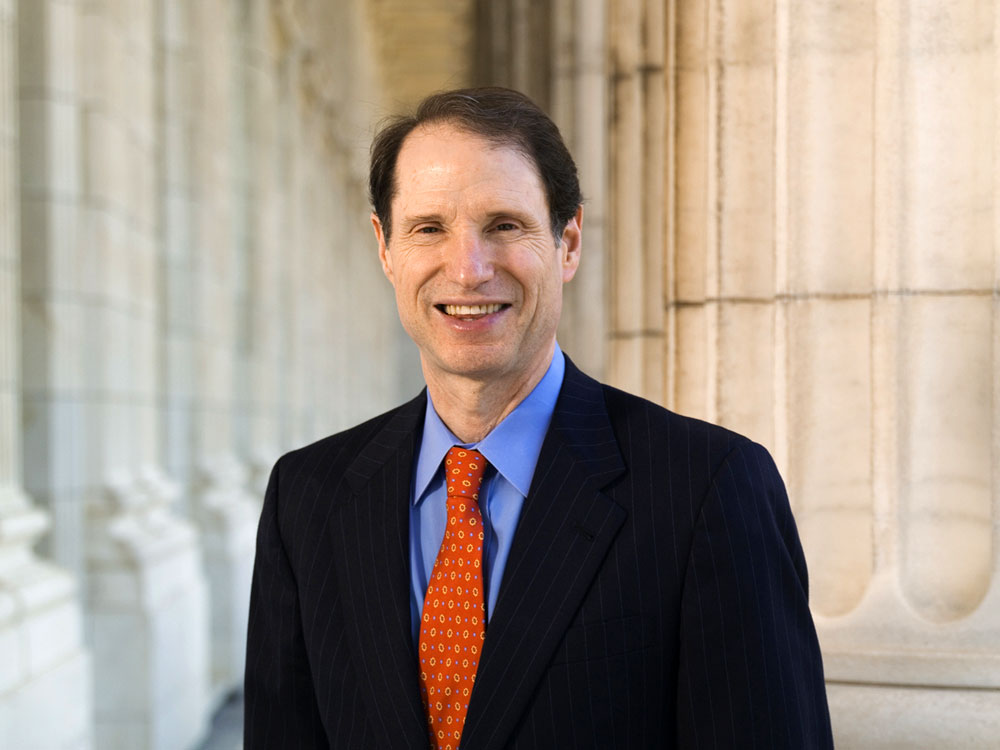US Senator Says Wireless Carriers Helping Trump Build 'Surveillance State'
Are AT&T, Verizon, Sprint and T-Mobile complicit in spying?

LAS VEGAS -- In a barn-burner of a speech at the DEF CON hacker conference here Friday (Aug. 9), Sen. Ron Wyden, D-Oregon, accused the major U.S. wireless carriers of selling out the privacy of the American people and willingly helping the U.S. government spy on its own people.
Wyden said wireless carriers can't resist government pressure to cooperate because they, unlike Apple or Google, rely upon FCC licenses to be able to use the airwaves. The wireless carriers and their predecessors have been at the core of government eavesdropping for decades, he said, and are complicit in secret government programs today.
"This issue is fundamentally about more than just privacy," Wyden said. "These programs are the building blocks that Donald Trump and his allies will use to increase the surveillance state and use it against their enemies."

He also told the thousands of hackers in the room that they were true patriots.
"White-hat hackers do our country an enormous service," Wyden said. "Hackers also make it harder for the government to hide when it spies on Ameicans or collects their information."
The strength of our hacker community makes America stronger and Americans safer. Thrilled to have the opportunity to speak at #defcon today about the importance of privacy, backdoor-free encryption, and overseeing our intelligence community. Thank you for having me! pic.twitter.com/VK2NeTqn9gAugust 10, 2019
The history of peacetime mass surveillance
Peacetime government mass surveillance on communications dates back to the era after World War I, Wyden explained, when the "Black Chamber" was set up by the U.S. Army and the State Department to read other countries' diplomatic cables, willingly passed along by American telegraph companies.
The program was shut down in 1929 by incoming Secretary of State Henry L. Stimson, who later summed up his decision as, "Gentlemen do not read each other's mail."
Get instant access to breaking news, the hottest reviews, great deals and helpful tips.
Wyden said that was followed in 1945 by Shamrock, a program that analyzed all telegraphic communications into and out of the United States, civilian, military or diplomatic. It ran for 30 years in complete secrecy until Congress began investigating the program in 1975.
After the Sept. 11, 2001, terrorist attacks, the NSA once again began surveilling Americans, Wyden said, until the program (called StellarWind) was revealed. Congress passed legislation in 2007 granting the telephone companies retroactive immunity for cooperating with the NSA on StellarWind.
"You can't do dragnet surveillance without the private sector being willing," Wyden said.
But the NSA continued conducting surveillance on American citizens after 2007, Wyden said, using a secret interpretation of Section 215 of the Patriot Act to justify the practice.
From DEF CON to Edward Snowden
As a member of the Senate Intelligence Committee, Wyden knew of the Section 215 program, but he was sworn to secrecy and couldn't reveal it. Ironically, Wyden said, it was DEF CON that "played a pivotal role" in exposing the program.
"Seven years ago, NSA Director Keith Alexander spoke here and looked you in the eye and said that allegations that the NSA spied on Americans were absolutely false," Wyden said. "I knew it was one of the most untruthful statements ever uttered."
Because Alexander had made that statement in public, however, it gave Wyden the right to publicly question other intelligence officials about what Alexander had said.
"At the next public intelligence oversight [committee] hearing, I asked [then-Director of National Intelligence] James clapper if Alexander was telling the truth," Wyden said. "Clapper said the U.S. was 'not willingly' collecting data on U.S. citizens. That was also a lie.
"A few months later, Edward Snowden revealed the collection of phone records," Wyden said. "Snowden later said he'd seen Clapper's testimony." (In fact, Snowden said Clapper's testimony was his "breaking point." )
Spying may still be going on
But even today, Wyden said, secret government mass surveillance continues.
"Earlier this year, the U.S. Inspector General revealed that the DEA had operated an illegal bulk spying program for 20 years," Wyden said. "This was one of the most illegal dragnet surveillance programs ever.
"Who signed off on it? [Current U.S. Attorney General] William Barr, when he was Attorney General in 1992," the senator added. "The total number of countries targeted has been hidden, but it's known that the program involved billions of phone calls."
"Not a single phone company ever pushed back" against the participating in the program, Wyden said. "In fact, they all got paid."
The wireless carriers also got paid for selling real-time location data of cellular customers to private data brokers, Wyden said, a practice that was documented in a series of investigative stories in Vice Motherboard. The location data was then sold on to other private entities, including bounty hunters who used the data to track fugitives.
"AT&T, Verizon, Sprint, T-Mobile all sold data," Wyden said. "The data was available to anyone who could pay. It was clear they were doing business with bounty hunters after they said they stopped. I'm not giving them any benefit of the doubt, and neither should you."
What you can do about government surveillance
But Americans shouldn't despair, Wyden said. Instead, they should act. Section 215 of the Patriot Act will expire at the end of this year unless the Senate votes to re-authorize it.
"As sure as night follows day, the Senate will wait until very last minute, when you all have your Christmas trees up," he said. "I am goign to push very hard to see if we can put a stake in this program and kill it once and for all."
But to do that, Wyden said, he needs citizens to write, email and call their senators and ask them to not renew Section 215. And he thanked all those who have exposed secret programs.
"Whistleblowers and white-hat hackers are our last line of defense against government surveillance," Wyden said. "Congress only acts when the American people speak out. Please, let's join together and make sure that we mobilize from sea to shining sea against unfair surveillance."

Paul Wagenseil is a senior editor at Tom's Guide focused on security and privacy. He has also been a dishwasher, fry cook, long-haul driver, code monkey and video editor. He's been rooting around in the information-security space for more than 15 years at FoxNews.com, SecurityNewsDaily, TechNewsDaily and Tom's Guide, has presented talks at the ShmooCon, DerbyCon and BSides Las Vegas hacker conferences, shown up in random TV news spots and even moderated a panel discussion at the CEDIA home-technology conference. You can follow his rants on Twitter at @snd_wagenseil.
 Club Benefits
Club Benefits





